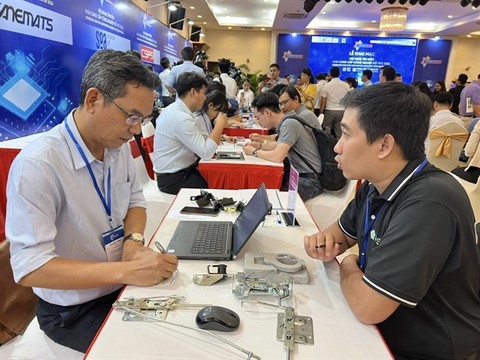
Lê Nguyễn Duy Oanh, deputy director of the Centre for Supporting Industries Development. — VNS Photo
HCM City has in recent years helped Vietnamese parts suppliers connect with manufacturing firms through programmes such as the Sourcing Fair of Supporting Industry with Buyers.
These initiatives enable local manufacturers to acquire technology and management experience, gradually modernising their production to join global supply chains.
Lê Nguyễn Duy Oanh, deputy director of the city Department of Industry and Trade’s Centre for Supporting Industries Development, speaks to Việt Nam News about this programme and upcoming plans to boost supporting industries.
Can you tell us about the Sourcing Fair of Supporting Industry with Buyers? How does it support Vietnamese component producers? What are prospects for local supporting industry firms entering global supply chains?
The Sourcing Fair of Supporting Industry with Buyers is organised annually by the Department of Industry and Trade in collaboration with the Board of Managment of Saigon Hi-Tech Park and the HCM City Export Processing and Industrial Zones Authority, under the guidance of the HCM City People’s Committee.
The programme is in its seventh edtion this year. The Centre for Supporting Industries Development has found that the programme has attracted special attention from supporting industry manufacturers because it helps them understand market trends and the demands of target customers such as foreign investors and large local manufacturing companies like Thaco, Tracomeco and Điện Quang.
These firms are dynamic, proactive and eager to learn and apply new manufacturing methodologies such as 5S, Kaizen and Lean to create more organised and productive work environments.
By connecting them with foreign-invested enterprises, we are seeing positive developments. Companies like Duy Khanh, Vĩ Nam Việt, Tiến Thịnh, Nhật Minh, and Minh Mẫn have achieved substantial progress and are engaging in the export chains of foreign companies. Some have even opened new factories in industrial zones and high-tech parks to stabilise production and aim for further growth.
On the other hand, through meetings with FDI companies and large-scale Vietnamese enterprises, we realised that they want to increase local sourcing due to geographical advantages and convenience.
I believe that prospects are bright for supporting industry firms to join in the global supply chains of foreign partners.
The key is that firms need to join hands to enhance their competitive advantages in the global supply chain.

Local parts suppliers discuss cooperation opportunities with foreign companies and major industrial end-product manufacturers at the 2024 Sourcing Fair of Supporting Industry with Buyers held in HCM City in late August. — VNS Photo
However, a number of supporting industry firms continue to face challenges, such as their products not being widely accepted in the domestic market and facing tough competition from foreign counterparts. What advice would you give them?
Supporting industry firms need to adopt long-term strategies, which means positioning themselves in the supply chain to make appropriate investment plans for production reform.
Vinavit Corp, for instance, has positioned itself as a global supplier of bolts and screws. They are ready to compete on the global market because they have spent three to five years investing in quality improvements and upgrading factories, equipment and management systems.
They have constantly invested and learnt new techniques. I believe this is a story from which other firms in supporting industries can learn.
Manufacturing firms must constantly innovate to ensure competitive advantages while generating profits that allow for reinvestment.
Recent trends show that most parts buyers now request a full range of components, rather than just individual parts.
Having directly engaged in various activities connecting domestic supporting industries with foreign-invested enterprises, I observe that only a handful of Vietnamese businesses can meet these demands.
Therefore, businesses need to continue improving their technical skills and knowledge, and invest in ISO standards, production capacity and human resource development to secure a foothold in global supply chains.
Additionally, collaboration between supporting industry businesses is crucial. Forming chains or clusters of components allows them to meet the stringent requirements of emerging technology markets and enhance their competitiveness in global supply chains.
Your Centre for Supporting Industries Development has been fostering the development of supporting industries for years. Looking forward, what do you plan do to enable more firms to join global supply chains?

A booth at the 2024 Sourcing Fair of Supporting Industry with Buyers. — VNS Photo
Our centre will pursue three main activities to assist supporting industry businesses.
First, we will continue to organise networking events to help supporting industry businesses connect with potential customers.
Second, we will host specialised exhibitions for supporting industries and set up virtual showrooms to promote Vietnamese supporting industry companies.
Third, we will continue coordinating with experts to provide training and develop human resources for the industry.
So far, we have focused on training firms in Kaizen, 5S and other factory management tools to help them improve capacity and reduce costs.
In the coming years we will provide on-site consulting services at factories with the participation of support services providers who offer 3D printing and other industrial service solutions. This will allow them to explore opportunities in emerging technology markets.
The city government pays great attention to developing supporting industries, which are considered the backbone of the city’s manufacturing sector.
The city has issued Resolution 09, which offers interest rate subsidies for loans to priority sectors, including the four key industries (mechanics, electronics-information technology, pharmaceuticals-rubber-plastics, and food processing), as well as supporting industries.
This policy gives businesses more motivation to invest in advancing their production and expanding their scale to meet market demands.
The city has also seen positive results in attracting investments, particularly in emerging industries such as semiconductors and aerospace. Having domestic manufacturers with good supply capacity is essential to creating spill-over effect and persuading existing investors to expand. — VNS